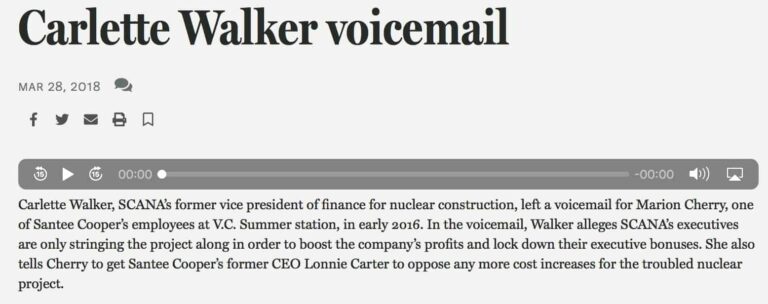What The Public Learned From The Utility Industry In 2018
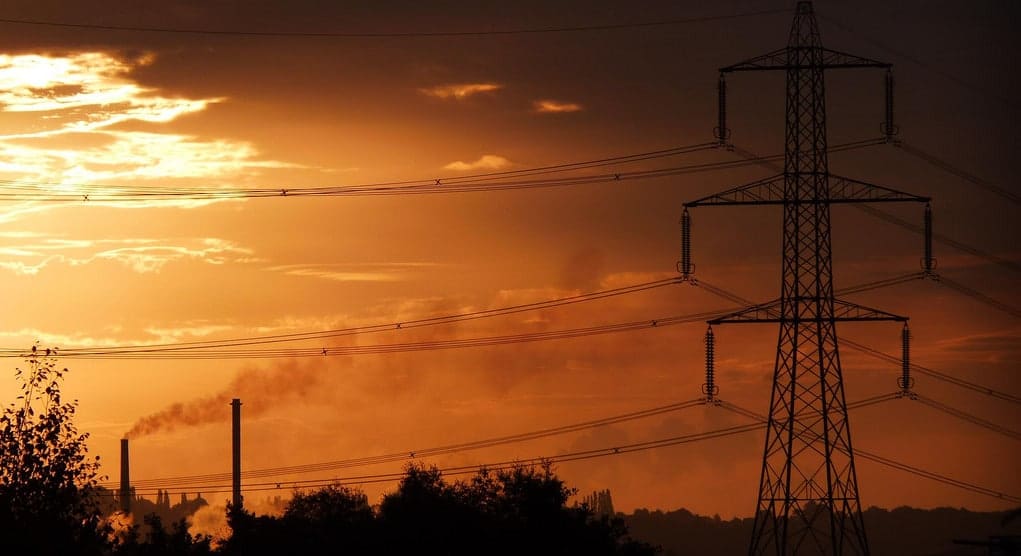
As the electric utility industry continues to evolve, individual companies earned positive coverage for essential actions such as greenhouse gas emission reduction plans and renewable energy development. Most notably is the announcement from Xcel Energy to commit to going 100% carbon-free by 2050. However, some companies made headlines for the wrong reasons, demonstrating that while certain utilities continue to make declarations to reduce emissions, more work needs to be done to hold these regulated utilities accountable.
1. SCANA executives pressed accountants to alter information and misinform regulators
In October, another former employee for SCANA said in a deposition that executives pressured him to lie to state regulators about the progress of the V.C. Summer nuclear project.
That deposition followed the release of a voicemail in March from the former Vice President of Finance for nuclear construction at SCANA in which the executive warned a Santee Cooper employee that the state-owned utility shouldn’t sign any more budget increases for the project because SCANA was mismanaging the project.
The former vice president also said in her deposition that she was pressured to lie and alter information given to state regulators.
2. Entergy deceived the public when confronted with questions about paid actors
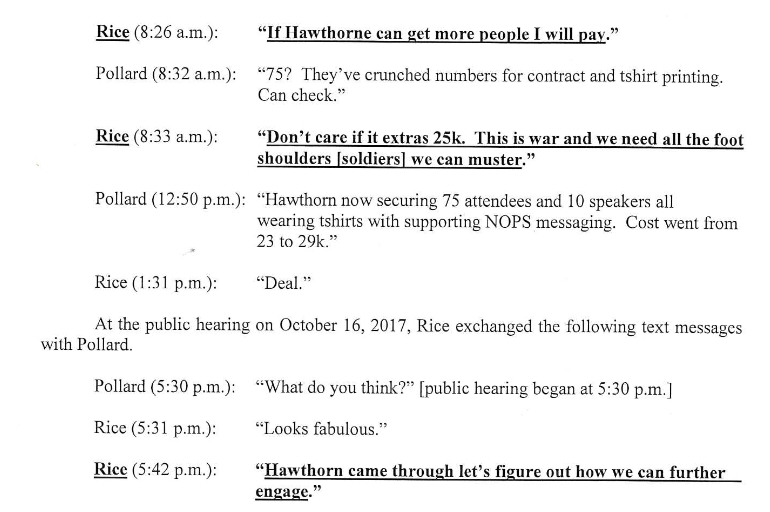
In May, Entergy said that the public relations firm it hired, the Hawthorn Group, contracted the questionable services of a publicity outfit, Crowds on Demand, without its knowledge. Crowds on Demand paid for people and actors to pack City Council hearings to make it appear the New Orleans community supported Energy’s proposed gas plant.
The utility said at the time, “We can confirm that Entergy did not pay, or authorize any other person or entity to pay, supporters to attend or speak at Council meetings, nor were we aware that any person or entity engaged on our behalf would do so or had done so.”
An independent investigation released in October proved otherwise.
The independent investigators stated,
“The information recovered and reviewed to date … indicates that payment (and the obligation to pay) for these “supporters” went from Entergy, through Entergy’s vendors, and onto these individuals in order to secure attendance and participation as speakers on Entergy’s behalf at public hearings that occurred on October 16, 2017, and February 21, 2018.”
3. Arizona Public Service pressured towns and counties to break the law
Emails show that Arizona Public Service (APS) knew or should have known it was asking Arizona counties and towns to break the law by passing resolutions against Proposition 127, the 50% renewable energy ballot proposal that was ultimately defeated.
On May 29, Yuma County Attorney Jon Smith emailed APS to tell the utility that having its Board of Supervisors sign a resolution against Prop. 127 would violate A.R.S.11-410. Days later, APS again emailed to ask the county to adopt a resolution.
Jon Smith again told APS that state statute prevents the county from passing the resolution, citing case precedent. Yet six counties and towns ultimately adopted the APS-backed resolutions opposing the ballot measure, which has resulted in an Office of the Attorney General investigation.
4. Dominion’s CEO and the Dominion Foundation helped fund the charity of lawmaker who then sponsored Dominion-backed energy legislation
In January, Democratic lawmaker Lamont Bagby, who had not previously sponsored or co-sponsored energy bills in the Virginia House of Delegates, agreed to be co-sponsor legislation with Republican Delegate Terry Kilgore that was written in part by Dominion. It was soon revealed that the charity Bagby worked for received a $100,000 donation from CEO Tom Farrell and $25,000 from the utility’s foundation in 2016 – all increases from the previous years.
Bagby’s sponsorship boosted the legislation in the House since 13 new lawmakers entered that chamber who had signed pledges not to accept Dominion Energy the previous November.
5. Consumers Energy spent $20 million in one year alone to prop-up a front group
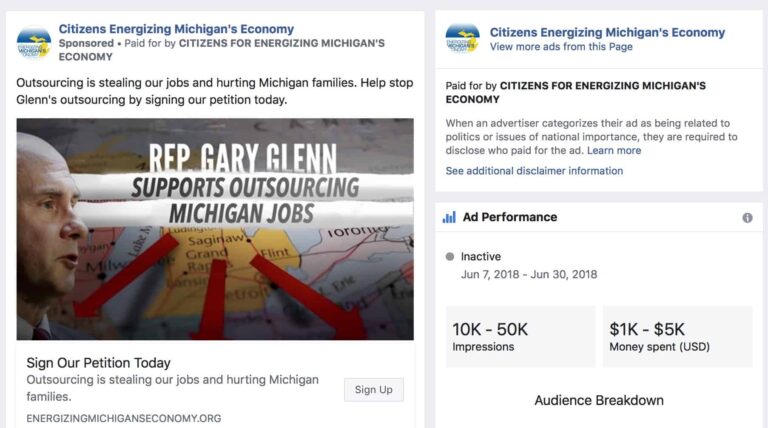
Documents filed by Consumers Energy with the Michigan Public Service Commission show that the utility contributed $20 million in 2017 to a group called Citizens to Energize Michigan’s Economy – also called Citizens for Energizing Michigan’s Economy.
The Consumers Energy-funded group then ran radio, television, and print advertisements in Michigan’s 2018 primary and general elections to promote, unseat or prevent specific candidates from winning. The group helped contribute to House energy committee chairman Representative Gary Glenn’s primary defeat in his bid for a state senate seat but failed to prevent Annette Glenn from winning her race in the 98th district.
Rep. Gary Glenn told Midwest Energy News after his defeat,
“Many legislators walk around scared of their own shadow when it comes to utility lobbyists. I am more disappointed in that than I have been about having lost the race — the fact that they’ll be able to intimidate other lawmakers by pointing to what they did in my race.”
6. FirstEnergy and Exelon lobby for higher electricity bills
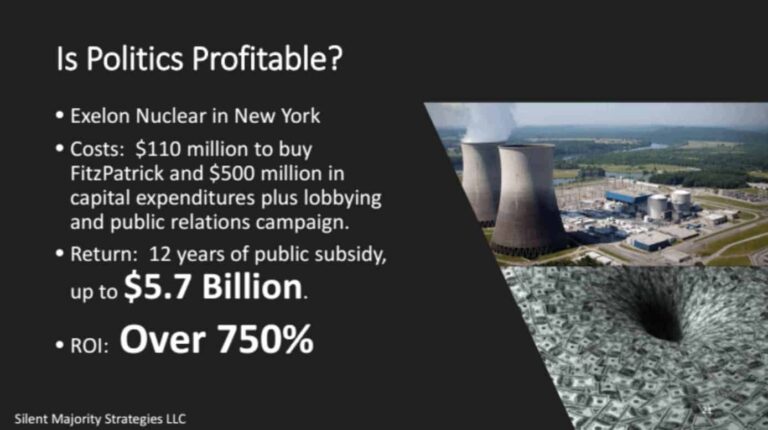
Earlier this year, LittleSis uncovered a presentation a former Exelon lobbyist gave at an oil and gas industry conference in which the lobbyist boasted about the return on investment the utility giant has received for the millions of dollars spent on lobbying and public relations. The lobbyist listed Exelon as a registered client of his in Pennsylvania during the time of the New York deal.
A columnist for the Houston Chronicle recently reported on how Exelon is working with other utility generators to lobby commissioners appointed by Texas Governor Greg Abbott to change how the Electric Reliability Council of Texas (ERCOT) determines prices in that market. The generators are looking to receive billions in higher revenues through electricity bills.
Meanwhile, FirstEnergy-hired lobbyists at Akin Gump have spent hundreds of hours working on a campaign to secure bailouts from the Trump administration and state lawmakers in Ohio and Pennsylvania. The filing in the FirstEnergy Solutions bankruptcy case offered a rare look inside Akin Gump’s high-priced lobbying campaign on behalf of the utility.
7. Eversource and National Grid secretly fund coalition lobbying state leaders to support gas expansion projects
Launched earlier this year, the Mass Coalition for Sustainable Energy joined the pipeline debate in Massachusetts. Huffington Post detailed that its first move was to send a letter to Governor Charlie Baker to urge him to help expand gas pipelines in the region. The letter was only signed by several business and civic leaders. The website just listed business organizations.
The funders of Mass Coalition were unknown until a lobbyist confirmed to HuffPost that Eversource and National Grid, along with Enbridge, were privately baking the effort, despite not being mentioned on the website nor letter to the governor.
8. Arizona Public Service lobbyist complains about the press in text messages with the utility’s regulator
In response to text messages from Arizona Corporation Commissioner (ACC) Andy Tobin about an Arizona Republic column, APS lobbyist Greg Bernosky texted back, “Happy New Year. I think one of my resolutions may be to start referring to that paper as the ‘local tabloid.’”
The text messages along with Tobin’s calendar reveal the close relationship APS has with one of their regulators on the ACC in which they don’t just commiserate over negative media, but also meet for drinks and dinners, and privately discuss language for energy plans.
9. Dominion backed down when challenged over a plan to build compressor station across from Mount Vernon, but continues with Buckingham station
Over the summer, the Mount Vernon Ladies’ Association launched a campaign to stop Dominion from constructing a compressor station across the Potomac River from the Mount Vernon home of President George Washington. Days after the launch of the campaign, Dominion agreed to work with the association to find an alternative.
However, Dominion continues with its plan to construct a compressor station for its Atlantic Coast Pipeline in Union Hill, Buckingham County, which is a historic African American community. In response to those in the Buckingham community that have voiced their opposition, Dominion has offered $5.1 million to expand emergency services and build a new community center. The millions of dollars will only be contributed if the compressor station is built.
Last month, Dominion also urged NAACP state president Kevin Chandler to write a letter saying he was “satisfied with the progress” Dominion made with safety concerns. Chandler was also told by Dominion to send the letter back to them as well as Gov. Northam. The utility soon distributed Chandler’s letter at community meetings, which led to confusion within the Virginia NAACP State Conference and in Union Hill as they opposed the project.
Days later, the Virginia State Conference issued a new letter to Gov. Northam restating its opposition: “To be clear, the Virginia State Conference of the NAACP continues to oppose both the compressor station and the pipeline and urges the Virginia Air Pollution Control Board to deny Dominion’s permit application.”
10. Nuclear energy group connected to Southern Company spends $1 million in Georgia Public Service Commission runoff election
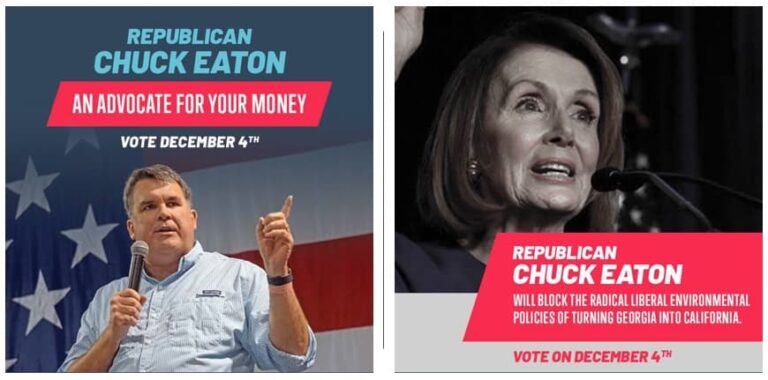
Democrat Lindy Miller and Republican incumbent Chuck Eaton had to go to a runoff election in the District 3 Public Service Commission (PSC) election this year. A majority of Eaton’s contributions came from people and companies associated with regulated entities in Georgia, but that paled in comparison to the $1 million infused in the runoff from Nuclear Matters, the advocacy arm of the Nuclear Energy Institute. The money went to a newly created front group called Georgians for a Brighter Future. The group then began to run pro-Eaton advertisements.
Miller said during the campaign that she is opposed to ratepayers paying for cost overruns for the nuclear expansion project at Plant Vogtle.
Both Georgia Power and Southern Company’s nuclear division subsidiary are members of the Nuclear Energy Institute, as is the law firm Troutman Sanders, which represents Georgia Power. Furthermore, members of Nuclear Matters’ executive committee and advisory council include Southern Nuclear’s president and CEO Steve Kuczynski, and Vogtle supporters Stan Wise, former Georgia PSC Chairman, and University of Georgia Professor David Gattie.
Eaton won the runoff election with 52 percent of the vote.
11. PNM Resources and American Electric Power attempt to get voters to help pick their preferred utility regulator

Ahead of the Public Regulation Commission (PRC) primary on June 5, New Mexico’s largest investor-owned utility, Public Service Company of New Mexico (PNM), spent $440,000 through a PAC to promote incumbent utility regulators in their reelection campaigns. New Mexicans For Progress, the PAC which received the money from PNM along with an additional $25,000 from American Electric Power, sent mailers to people in PRC Districts 4 and 5 to urge residents to vote for Lynda Lovejoy and Sandy Jones, respectively. The utility said the money spent was needed to “help ensure a fair election.”
Both Lovejoy and Jones lost their primary races.
12. Edison Electric Institute uses We Stand For Energy to fund Facebook ads to aid utilities defeat of pro-solar legislation
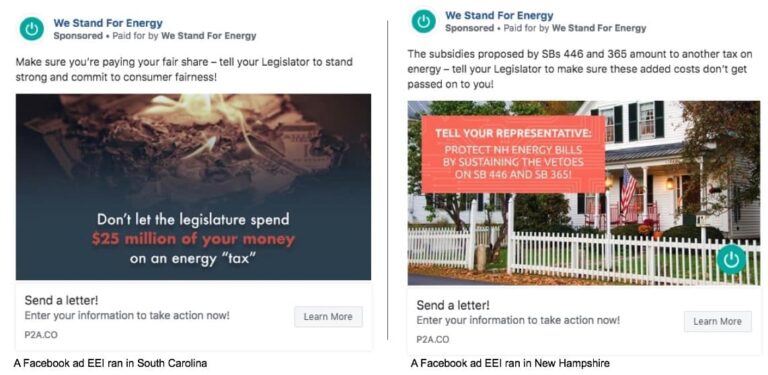
While South Carolina and New Hampshire lawmakers debated pro-solar legislation this year, people in those states were targeted with Facebook advertisements telling them to contact their legislator to make sure the policies didn’t get enacted. The advertisements at the time said they were sponsored by a group called We Stand For Energy.
In these cases, Facebook users would have had to carefully examine the We Stand For Energy page and website to find that it is run by the Edison Electric Institute, the trade association for investor-owned utility companies.
In November, ProPublica published an investigation into Facebook’s ad rules that found EEI and other energy companies and organizations ran campaigns that resembled “a digital form of what is known as ‘astroturfing.’” After ProPublica’s article, EEI changed their We Stand For Energy Facebook advertisements to state they are paid for by EEI. A spokesperson for the trade group told ProPublica that they use the group as a “grassroots platform that unites and educates customers and key community stakeholders.”
Legislators failed to override New Hampshire Governor Chris Sununu’s veto of the solar legislation, and utilities helped defeat the bill in the South Carolina House of Representatives.
Image source: Flickr creative commons user langleyo. https://flic.kr/p/a56ycN

